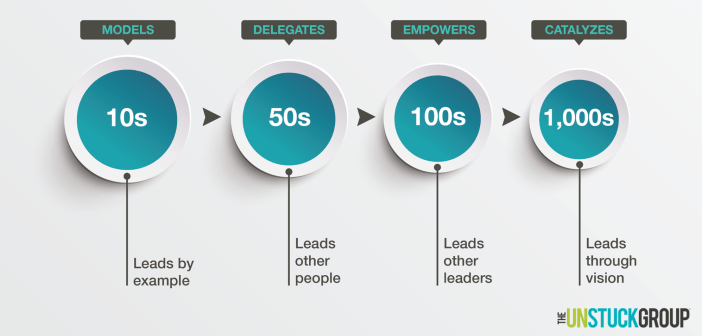4 Ways To Advance On The Leadership Pathway
By: Vanderbloemen

All leaders need intentional development to help them discover their capacity and grow to new levels. Unfortunately, people get stuck at levels of leadership in the church. People who start out leading 10s may have the capacity to become leaders of 50s. People who lead 100s well may be great leading 1000s, but then again, they may not. It is important to understand and invest in people regardless of their current level of leadership.
Here are some examples of the different types of leaders on the leadership pathway:
Models: Leads 10s – Leads by example. Competencies for this level of leadership include:
- Leading from your strengths
- Practicing personal disciplines
- Modeling a bias for action
- Managing your time, including work-life balance
Delegates: Leads 50s – Leads other people. Competencies for this level of leadership include:
- Setting clear expectations
- Managing conflict
- Communicating effectively with your team
- Building teams of volunteers
- Discipling other people
Empowers: Leads 100s – Leads other leaders. Competencies for this level of leadership include:
- Measuring and evaluating for results
- Developing and mentoring leaders
- Dealing with underperformers and dysfunction
- Stewarding people, time and money
- Planning for the future
Catalyzes: Leads 1000s – Leads through vision. Competencies for this level of leadership include:
- Casting vision
- Developing a senior leadership team
- Renewing vision and strategy
- Leading change
- Shaping culture
When studying leadership, it can be easy to stereotype leaders of large numbers as the best, assuming they’ve reached the pinnacle of leadership development. The truth is, some people have an innate ability to inspire and lead 1000s and some people, no matter how hard they work, will never truly be gifted at leading at a higher level than the one they are leading now. Leadership is important at every level and the church needs each of the types of leadership gifts working together for the good of the Kingdom.
Here are a few next steps that may help you advance on the leadership pathway:
1. Be honest about your capacity and grow in your unique abilities.
2. Don’t wait for a position to begin demonstrating influence.
3. Stay willing to lead in ways other than how you are currently positioned (People who lead 1000s still need to lead by example).
4. Get mentoring, training, and coaching to help you grow to the next level.
Tony Morgan is a Ministry Partner of Vanderbloemen Search Group. He is also the CEO of The UnStuck Group, which helps churches get unstuck by consulting and coaching on vision, strategy, and action. Connect with him at @TonyMorganLive & TonyMorganLive.com.
If you liked this, you'll also like 9 Essential Qualities Of Exceptional Leaders.



